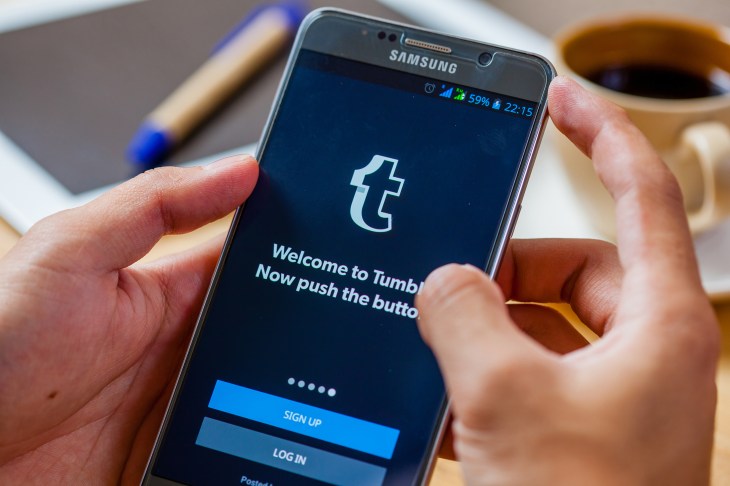
Tumblr is making a change to how it deals with hate speech on its blogging platform. The company announced today it will also remove the reblogs (repostings) from any blogs that were suspended for violating its policies around hate speech. Already, the company says it’s identified nearly 1,000 blogs that were banned for blatant violations of its hate-speech rules. Most of these blogs contained Nazi-related content, it said. This week, Tumblr began to remove all the reblogs from these previously banned sites, as well — a number totaling 4.47 million individual posts.
In an announcement, Tumblr explains its reasoning behind the decision to also remove the reblogged material:
We’ve listened to your feedback and have reassessed how we can more effectively remove hateful content from Tumblr. In our own research, and from your helpful reports, we found that much of the existing hate speech stemmed from blogs that have actually already been terminated. While their original posts were deleted upon blog termination, the content of those posts still lived on in reblogs. Those reblogs rarely contained the kind of counter-speech that serves to keep hateful rhetoric in check, so we’re changing how we deal with them.
In other words, it saw no value in allowing the hate speech to live on in this reposted state, as the majority of the reblogs weren’t engaged in providing what Tumblr referred to as “educational” or “necessary counter-arguments” to the hate speech.
When asked if it did, in fact, remove reblogs of an educational nature, Tumblr said it used human moderators to determine which content was in violation and which was not. Any blogs containing “productive counter-conversations” or “educational blogs” were not removed as part of this process, we’re told.
In addition, Tumblr says that moving forward it will evaluate all blogs suspended for hate speech and consider mass reblog deletion when appropriate.
The company consulted with outside experts to determine the right course of action. Ultimately, Tumblr believes the new approach is aligned with the recommended best practices it has been advised to adopt regarding hate speech.
“We are, and will always remain, steadfast believers in free speech. Tumblr is a place where you can be yourself and express your opinions. Hate speech is not conducive to that,” the company’s announcement read. “When hate speech goes unchecked, it eventually silences the voices that add kindness and value to our society. That’s not the kind of Tumblr any of us want.”
Tumblr also noted the decisions it’s making aren’t being left up to AI and algorithms. Instead, Tumblr asks users to flag for review by Tumblr’s Trust & Safety team hate speech they come across.
As expected, there’s a debate about the policy taking place in the comments of the Tumblr post about the changes. On one side are those who support the idea of companies enforcing policies around the sort of content they do not want to host. On the other are the free-speech advocates who see any such policy as a form of censorship.
The effort to take more action on hate speech follows Tumblr’s 2018 decision to ban porn from its platform after getting kicked out of Apple’s App Store for hosting the content. Similarly, hosting hate-speech reblogs could cause problems with Apple’s own rules.
Tumblr has made few changes since its acquisition by WordPress owner Automattic from (TechCrunch parent) Verizon in 2019. But its earlier decisions to clean up its site have had a negative impact on its traffic.
Its significantly devalued price point at the time of the Automattic deal was attributed to its decision to remove NSFW content. Almost every meaningful metric was down year-over-year since the ban, including total visitors, uniques, average site visit, traffic, daily active users and more. Meanwhile, the younger demographic who used to populate Tumblr in the millions have largely moved on to expressive, video-centric social platforms, like TikTok and Twitch.
Tumblr’s Community Guidelines haven’t been updated to include its decision to remove reblogs of hate speech, but its full hate-speech rules can be viewed here.
source: techcrunch
